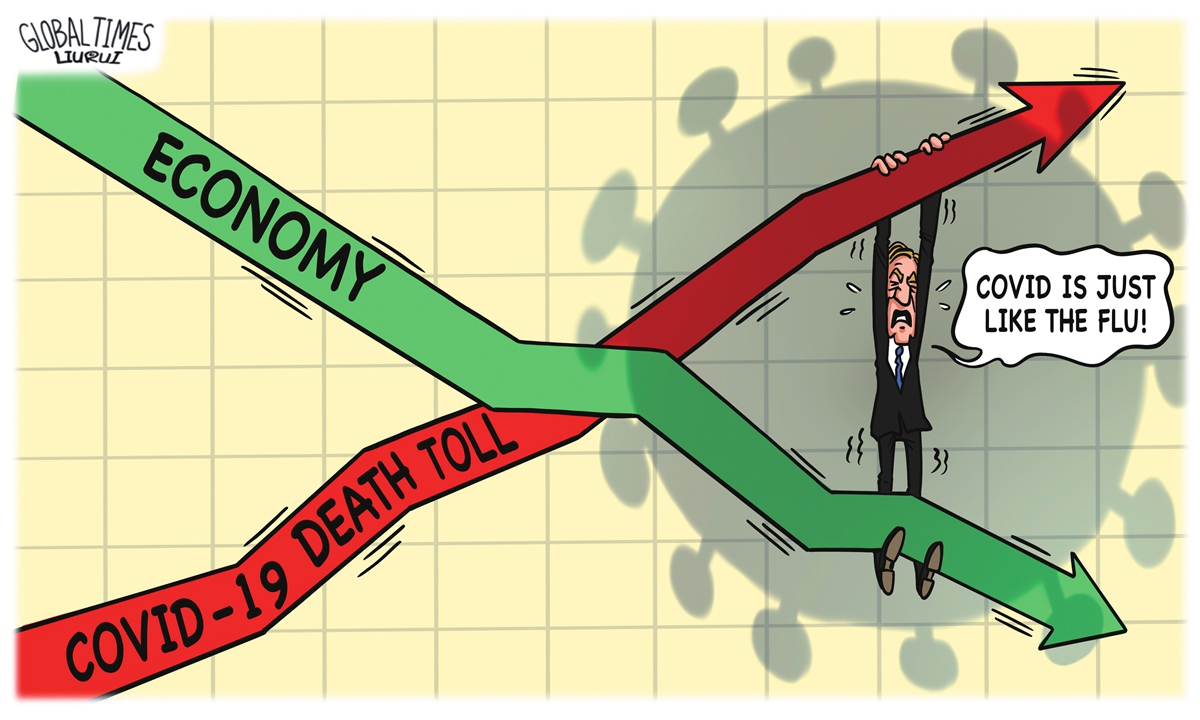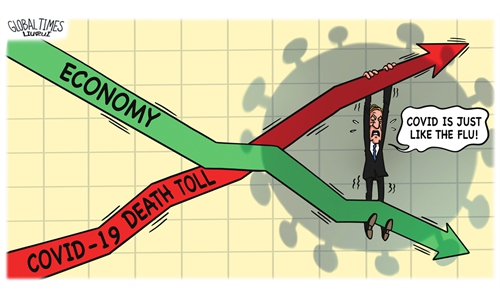
COVID is just like the flu! Illustration: Liu Rui/GT
I caught COVID in March this year, after hospitals had gained two years of experience through fighting the pandemic. I had also received two doses of the vaccine and a booster, building up my resistance to the point I could fend off the illness self-isolating at home, without consulting medical help. I was able to obtain free lateral flow tests by going to my local pharmacy, getting as many as I needed by asking.
Although I was required to self-isolate I had income and was able to pay for food deliveries to my home. Some people were far less fortunate but most were able, at least earlier in the pandemic, to receive 80 percent of their wages though the government's furlough scheme: without this, many people may have refused, out of sheer need, to comply with lockdown. It must have been torture for those in lockdown with no outdoor space such as a garden or no partner to offset the sense of isolation.
But now things have changed. There is no furlough, tests must be bought, and can just up to £27 for an LFT, and £79 for a PCR test. These don't encourage people to comply with medical practice. England has dropped almost all COVID restrictions, even the legal requirement to isolate, even though COVID is not a thing of the past and rates remain high.
The UK government says the state cannot afford to keep giving away tests for free, or keep paying wages which cost millions more. But there is another argument that making people pay for relatively expensive tests (and they will need many tests to safely monitor their welfare) at a time of financial crisis when many homes are close to domestic disaster, will discourage people from taking the tests, and therefore increase the risks of COVID spreading undetected.
The government has always denied that financial concerns affected its judgment calls on public health, but I doubt it. There have been occasions when the mask slipped and what I think is the primary concern of the UK's governing elite shone through.
It isn't the first time in Britain where there has been a trade-off between public health and the economy. It's a basic question: Did the government put people or profits first?
China, with its "Dynamic Zero-COVID" policy, seems to have chosen the former. The UK chose the latter - even if ministers have protested that it was not so. During the height of the crisis, Prime Minister Boris Johnson told a private meeting of Tory MPs that "greed and capitalism" were responsible for the remarkable success in developing a vaccine and rolling it out across the population (one of the stand out, and few, unquestionable successes). He told them: "The reason we have the vaccine success is because of capitalism, because of greed, my friends."
Presumably, this was the same profit motive which allowed political cronies and party donors to receive preferential treatment when bidding for contracts worth hundreds of millions of pounds to supply critical equipment such as masks and gowns for the National Health Service, even when the bidders had no experience of the sector of industry in which they were bidding.
Britain was already poorly placed to deal with any kind of pandemic, given that the NHS defenses had been allowed to diminish over the past years by successive government's under-funding.
A full inquiry is expected to begin later this year, but whatever its findings it will not bring back the 177,000 people who have died. The MPs' committee said the pandemic had exacerbated existing social, economic and health inequalities in Britain which have never been farther apart, and death rates among ethnic minority groups, and people with learning difficulties were "unacceptably high".
So in a country which prioritizes the economy over public safety, it is understandable that there are critics of China's markedly different approach, because the critics clearly have different priorities. In the West, China is acknowledged as the most impressive worldwide generator of economic growth for at least two decades. But also in the West, they think only in the economic short- to-medium term. This is because often they do not think beyond what will ensure their next term in government for another five years.
For this reason they do not understand China's Zero-COVID approach, which places health and safety ahead of economic well-being, but which also strives for economic well-being in the future: the equation is simple - without a healthy population you cannot have a healthy economy.
For these reasons, China is braced to take the economic hit of placing major cities like Shanghai, its most prosperous, and other provinces, into lockdown. It produces hardships but protects lives. This is important in a country where there are 267 million elderly people, almost as many with underlying health problems and where vaccination rates are not as high as in, say, the UK. One study has predicted that without its Dynamic Zero-COVID policy China would be facing more than 1.5 million COVID-induced deaths. It is a policy which requires long term commitment, but seems to be working. In the key financial hub of Shanghai, for example, factories and businesses are slowly reopening.
The threat to people is immediate. The risk to the economy is transient: it will recover. Put people over profit.
The author is a journalist and lecturer living in Britain. opinion@globaltimes.com.cn


